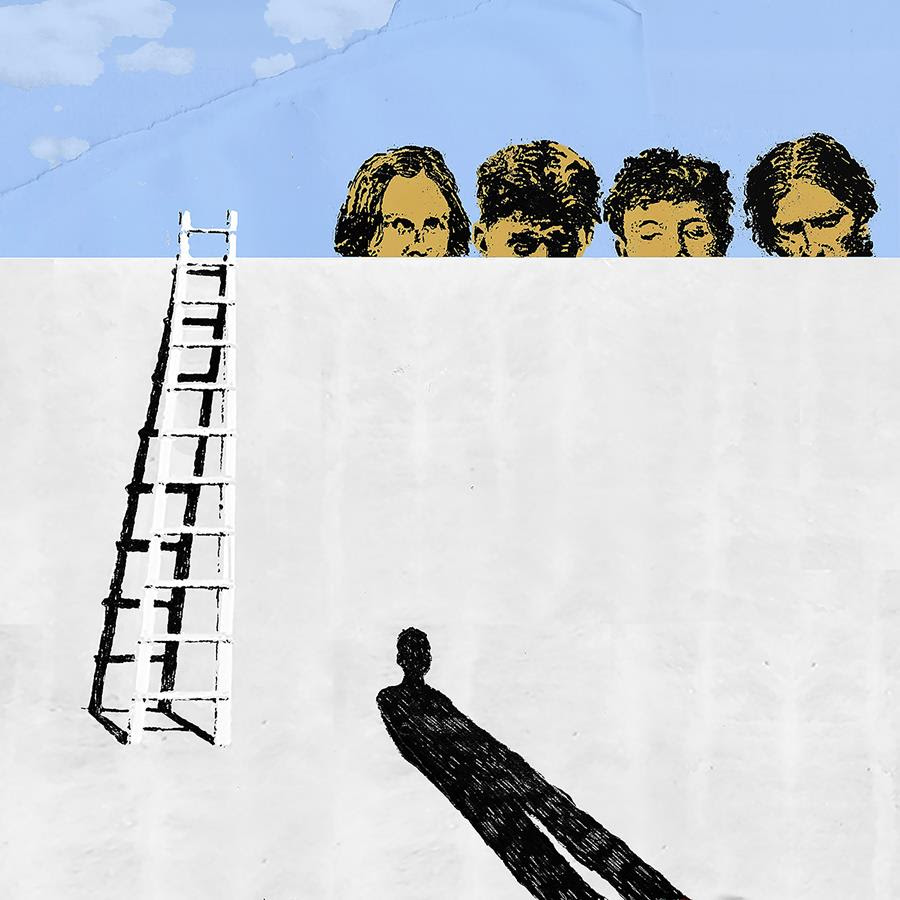Band To Watch: Humour

Rosie Sco
A man is convinced a gang of mischievous creatures is psychologically torturing him — messing with the temperature of his apartment, cooking food and playing vinyl, ransacking the pantry. But he’s gonna beat the little fuckers at their own game. He slips on his Crocs and, over a flurry of discordant guitars and bludgeoning drums, screams: “I’m going to smoke them out of my house/ They won’t go, so I’ll go, but I’ll take them with me.” This isn’t the plot to some sci-fi thriller, but the crux of “Neighbors,” the abrasive lead single and opening track of Glasgow five-piece Humour’s debut album Learning Greek.
Guitarists Jack Lyall and Ross Patrizio and vocalist-lyricist Andreas Christodoulidis are grinning over Zoom when they tell me they were elated by how upsetting listeners found it. “We got comments on YouTube about how bad or stressful it is,” Patrizio laughs. “It was nice. I was like, ‘Oh yeah, that is kind of annoying to listen to. That’s good. I’m glad we did that.'” Lyall adds, “Yeah, I kind of forgot that was the plan until people were like, ‘I fucking hate this.'”
There’s something completely off-putting in every Humour song, but it’s always offset by absurdity — maybe a bed-wetting quiver, an uncanny time signature, or an attractive melody. Each song has its own temperamental yin-and-yang structure. Some tuck you inside cozy pop-punk melodies, then rip the covers off and dump an ice bucket on you. As a result of living together during lockdown, they’ve been honing a deliberate, harrowing kind of allure.
The tension within Humour’s amalgamation of post-hardcore, 2000s post-punk, melodic emo, and post-whatever-the-fuck is both intentional and chaotically derived. (Which might explain why their songs often feel like genuine jump scares.) From our conversation, their songwriting process boils down to leaning into their dumbest epiphanies and pushing them well beyond their limits. “Basically, we tried like 1,000 stupid ideas, and these are the 10 that worked,” Lyall says of their album.
Their latest single “In The Paddies,” which you can listen to below, exemplifies their mistake-driven method. “We accidentally did some weird rhythm thing, because we’re bad. Then the stupid idea we had was that Andreas would just do like gibberish, not real words and verses,” Lyall explains. “Then people said to us that if it sounded like it was a real hook and a verse, it’s quite fast, so you had to write a lot of words quite quickly.”
“Yeah, it feels like I’m rapping,” Christodoulidis laughs. “But it was a good way to arrive at that because I probably wouldn’t have made the verse part of that that fast or frantic if I knew I was going to have to write words to it.” He continues, “I do remember that the first verse was already kind of quite difficult to kind of comprehend and sing along to, and then you guys decided to really fuck up the second verse even more. I remember thinking, ‘This is too much.'” They all laugh.
Patrizio elaborates that it’s remained one the group’s favorite tracks because of an off-kilter quality that isn’t as abrasive as some of the album’s other tracks: “It’s just awkward, and a different way of being annoying, which I really like because I just have a different kind of a payoff.”
Some artists learn the rules just to break them. Humour’s controlled chaos comes less from formal training and more from curiosity and a group of close-knit friends egging each other on. All three tell me they’re untrained when I ask about their musical background. Though, Patrizio adds that bassist Lewis Doig is “good musically and like pitch perfect” and will guide them technically.
“Sometimes we write a good thing because we’re bad, if you know what I mean,” Lyall says. Patrizio adds, “We got asked this recently, and I think I exaggerated how not-musical we are. We love it, and we’ve always played instruments. But it’s not as if we were all even like session musicians, or could play in other bands or whatever. We’ve always just played music together and not particularly well. As a band, we got good at what we feel like we need to be good enough at. People often speak to me and Jack about specific guitar stuff or techie stuff or whatever, and we have no idea.”
The buildup to Humour has been years in the making. Christodoulidis and Patrizio have known each other since primary school, linking with drummer Ruairidh Smith at the start of high school and then Doig and Lyall in university.
Christodoulidis describes the approach to musical projects pre-pandemic as a bit “aimless.” Starting Humour just before lockdown allowed more time and space to, as Patrizio explains, “be more deliberate about what we want to actually release, what we felt proud of, and what bits of it we thought were actually worth saying and emphasizing and making more extreme.”
They made their debut EP Pure Misery in their Glasgow flats, even building a vocal recording booth for the project — a chance to sidestep recording in a professional studio, with all its attendant pressures and discomforts. For Learning Greek, they’ve upgraded to working with Rod Jones at Post Electric Studio. “But I think using a studio properly for the album was a good thing,” Lyall says. “It was a lot less scary than before.”
During lockdown, Humour pushed their sound to different extremes, trying to figure out what aspects of the music they wanted to highlight, one being Christodoulidis’ lyrics. Lyall notes that they could never be a proper noise band because of their interest in hooks and catchy melodies — “and we equally get bored of something that doesn’t excite us in some way. That’s the one thing that’s been constant, is playing with that kind of contrast and trying to find ways to just slightly throw a song off, whether that’s a stupid idea or whatever it is.”
In the beginning, as Christodoulidis’ lexicon of screams and the group’s sound became more dissonant and heavier, people started to compare their sound to American hardcore groups like Title Fight, La Dispute, and Tigers Jaw. But these were much heavier groups than what they’d ever listened to before.
“People kept coming up to us at shows and saying you sound like these American bands like La Dispute or Title Fight or something, and we hadn’t heard of them. Then we’d listen to it and really enjoy it. It was a really weird way for discovering new music, like unintentionally playing it, and then people telling you that you sound like it,” Lyall muses. “Now, that’s kind of all we listen to.”
The dissonance within Humour’s music isn’t only confined to their mangled steel-wool sound. For Learning Greek, Humour present as a Scottish group whose singer screams in an exaggerated American accent, but the album’s core concept is tied to Christodoulidis’ reconnection with his Greek heritage, all of it a natural outgrowth of what excited them and seemed to work. “I don’t know how it would have gone if we tried to discuss from the start what we were going to write an album about. It was stressful enough, the idea of writing an album at all,” Patrizio reflects.
The album’s title is a lyric from a throwaway track. “We quickly agreed this is not a good song, but we really liked the title. I thought, well, a lot of the songs are about family and history and stories being passed down,” he says. Some songs are inspired by Greek mythology, while others are fictionalized versions of family or friends.
A recording of Christodoulidis’ father appears on the title track, a decision made after the album was mostly finished. “It made sense to have him on it. I started recording him speaking every so often, if he was kind of saying something interesting, or reading from something or just conversations we were having,” he says. “The fuzziness is just because it’s from my phone, but it does work. The fact that there’s words you can’t always hear, and then obviously, the fact that a lot of it is in Greek is an extra layer of veil.”
Christodoulidis is forthcoming but softspoken. Whereas his bandmates describe the process of highlighting his labyrinthian lyrics, he reiterates various methods of obfuscating the songs’ personal origins. “If things start to become very personal or too exposing, then sometimes I like to mask it, or abstract it by throwing in something funny if it’s getting too serious,” he says. “The accent is another way of slightly removing it from the fact that it’s about me sometimes.”
Whether through intense character exercises or filtered through Greek literature, a lot of the songs touch on mortality: How to create authentically (“Plagiarist”). How to delay (or prepare for) death through leaving tokens behind (“Die Rich”). How to divulge damning stories (“I Knew We’d Talk About It One Day”).
But all this rises to the surface after Christodoulidis puts finger to notes app. He reminds himself there’s no pressure for any of it to make sense. “It doesn’t matter, either way, how you arrive at the thing, or how it’s interpreted really, or if people interpret it the way you hoped they would or planned that they would. It doesn’t really matter,” his voice trails off. Lyall and Patrizio nod in agreement.
With Humour, it’s all a bit fuzzy. It’s all a bit dark. As Christodoulidis screams on “Dirty Bread,” it’s all “fragments you shore up, the pieces you stockpile in the face of your ruin.”

Learning Greek is out 8/8 via So Young. Pre-order it here.






